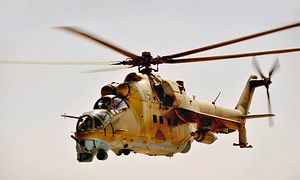In Foreign Policy Magazine last November, I highlighted that Ashraf Ghani’s administration was attempting to pull out Hamid Karzai’s playbook on India, utilizing relations with India to push Pakistan into action against the Taliban and future peace negotiations. In both cases, Afghanistan gained halfhearted attempts by Pakistan to bring the Taliban to negotiations.
In November last year, Afghanistan received four Mi-25 gunships from India; the military package sent a signal to Pakistan. Feeling pressure from the international community, Pakistan agreed to participate in the first meeting of the Quadrilateral Coordination Group (QCG) of Afghanistan, China, Pakistan, and the United States on Afghan peace and reconciliation, which took place in January.
After several meetings of the QGC and no results it appeared Pakistan was not serious about bringing the resurgent Taliban to the table. The April 2016 bombing of an elite Afghan intelligence unit in Kabul, which killed 28 and wounded over 300, sent a signal that Pakistan was not concerned with peace — shattering hopes of any reconciliation in the region.
Both Karzai’s and Ghani’s attempts at establishing relations with Delhi have generally been designed to send signals to Pakistan — a tit for tat game in which the war torn country would get some small token of success from the endeavor. In the case of Karzai’s overtures to India, Afghanistan received 105 mm Howitzer artillery pieces; Ghani received Mi-25 gunships. However, this time it appears Afghanistan’s reach out to India is far more serious and is being spearheaded by the United States.
The U.S. drone strike that killed Taliban Supreme Leader Mullah Mansour on Pakistani soil was a message to Pakistan that Washington no longer viewed Islamabad as a reliable partner in achieving piece in the region; it was one of the largest setbacks in U.S.-Pakistan relations since the U.S. raid that killed Osama bin Laden in Abbottabad, Pakistan.
To add insult to injury, the United States has canceled several defense contracts with Pakistan, sending a clear message that it will not tolerate Pakistan’s support of the Taliban in Afghanistan and its interference in the impoverished nation. In June of this year, the United States canceled a $270 million dollar subsidy to Pakistan for the purchase of American F-16 fighter jets. Furthermore, Washington scrapped a $300 million reimbursement program out of the Coalition Support Fund (CSF), a program that reimburses allies in support of counterterrorist operations, after Secretary of Defense Ashton Carter refused to tell Congress that Pakistan had taken adequate steps to fight the Haqqani Network (a U.S. designated terror group allied with the Taliban).
In an effort to fast track Afghanistan’s pivot to India, U.S. Secretary of State John Kerry has organized a trilateral meeting between the United States, India, and Afghanistan, set to take place in September at the United Nations summit.
Moreover, at the tail end of August, General John W. Nicholson, the current commander of the Resolute Support mission in Afghanistan, called on New Delhi to help arm Afghan forces. His remarks came after a visit by Afghan Army Chief of Staff General Qadam Shah Shaheem to the Ministry of Defense of India in which the general requested more technical and military assistance from Delhi.
Pakistan has expressed concerns over the deepening ties between India and Afghanistan, with Nafees Zakaria, spokesman for the Foreign Office of Pakistan, telling reporters, “Such cooperation should not be to the detriment of Pakistan.”
The rising tension between the Pakistan and Afghanistan resulted in the temporary closure of the Chaman border crossing during the last week of August. In an effort to overcome the main blocked transit route, Afghanistan entered a partnership with India to airlift fresh fruit to India, once again sidelining Pakistan for India.
After 15 years of war, the United States is spearheading Afghanistan’s pivot to India. Previous attempts by the Afghan government have been met with modest gains — and at times been quashed over concerns of upsetting Islamabad. With the weight and support of the United States, Afghanistan may see more success. This of course will not come without a reaction by Pakistan — if not more bloodshed.

































